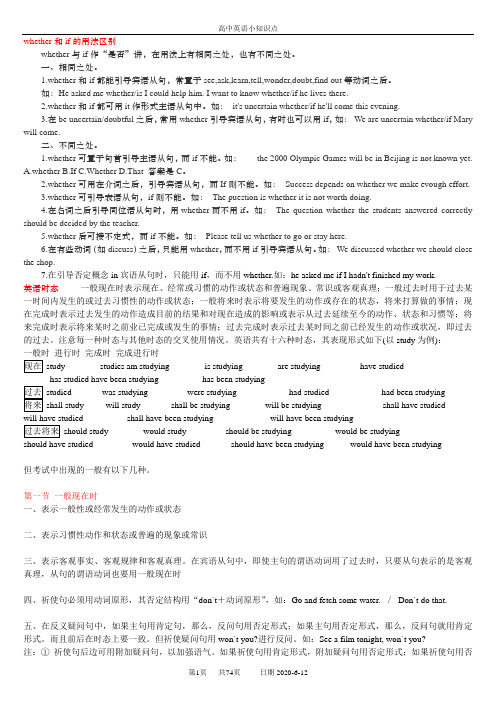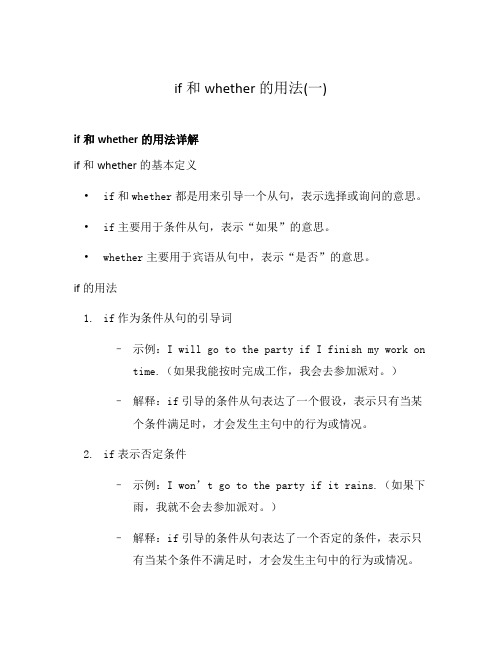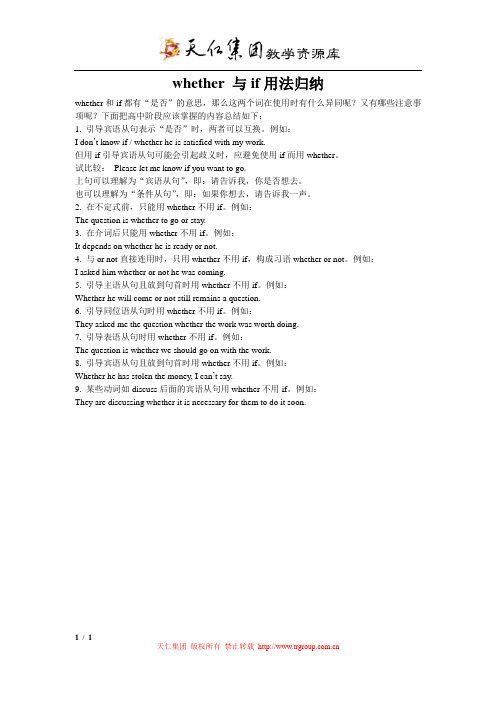中考英语高频考点词whether和if的用法解析
if与whether的用法

if与whether的用法一级标题:引言在英语中,if和whether是经常用到的条件从句引导词。
它们在不同语境下表达了不同的意义和用法。
本文将详细介绍if和whether的用法,并对其进行比较和区别。
二级标题:if的用法if是一个常见的条件从句引导词,在句子中表示一个假设、条件或可能性。
以下是if的几种基本用法:1. 表示真实条件:如果主句发生,从句也会发生。
例如:If it rains, I will take an umbrella.(如果下雨,我会带把伞。
)这里表示当天气出现雨时,我会带伞。
2. 表示非真实条件:如果主句未发生,从句也不会发生。
例如:If I were you, I would study harder.(如果我是你,我会更加努力学习。
)这里表示虚拟情况下,如果我处于你的位置上,我会更加努力学习。
3. 表示请求或建议:使用if来表达礼貌或委婉地提出请求或建议。
例如:I wonder if you could help me with this problem.(我想知道你是否可以帮助我解决这个问题。
)4. 表示感叹疑问:使用if来表示反问或质疑。
例如:If you can't do it, who can?(如果你不能做到,谁可以呢?)这里表示对于他人的能力产生了质疑。
二级标题:whether的用法在很多情况下,if和whether可以互换使用,但它们也有一些不同。
是否是一个常见的用法。
1. 引导间接问句:Whether引导间接问句时,表示是否某种情况成立。
例如:I asked him whether he could come to the party.(我问了他是否能来参加派对。
)这里表示询问他是否有可能参加聚会。
2. 引导宾语从句:在动词、形容词后面引导宾语从句时要使用whether而不是if。
例如:I don't know whether she will come or not.(我不知道她会不会来。
whether和if的用法区别

whether和if的用法区别whether与if作“是否”讲,在用法上有相同之处,也有不同之处。
一、相同之处。
1.whether和if都能引导宾语从句,常置于see,ask,learn,tell,wonder,doubt,find out等动词之后。
如:He asked me whether/is I could help him. I want to know whether/if he lives there.2.whether和if都可用it作形式主语从句中。
如:it's uncertain whether/if he'll come this evening.3.在be uncertain/doubtful之后,常用whether引导宾语从句,有时也可以用if,如:We are uncertain whether/if Mary will come.二、不同之处。
1.whether可置于句首引导主语从句,而if不能。
如:___the 2000 Olympic Games will be in Beijing is not known yet.A.whetherB.IfC.WhetherD.That 答案是C。
2.whether可用在介词之后,引导宾语从句,而If则不能。
如:Success depends on whether we make evough effort.3.whether可引导表语从句,if则不能。
如:The puestion is whether it is not worth doing.4.在名词之后引导同位语从句时,用whether而不用if。
如:The question whether the students answered correctly should be decided by the teacher.5.whether后可接不定式,而if不能。
whether和if的常见用法区别

whether和if的常见用法区别
Whether 和if都可以用来对条件进行判断,但两者有一定的区别。
首先,whether 是一个偏正式的词,通常多出现在文学作品中或者口头交流中,主要表示在一个特定条件下有两种可能性,否定(no)或肯定(yes),询问对方有没有某项能力,或者询问某件事发生或者没有发生:
例如:
I wonder whether you can solve this problem.
但是if更通用,尤其是出现在句子中,表示一个条件只有在满足另一条条件的前提下才能被实现:
此外,whether语气往往比if 弱,意思更接近whether…or not 的表达,表示有可能发生或者不发生:
而if语气较强,表达某一条件必须被满足:
综上所述,whether主要用于询问某一条件的可能性;而if则表示满足一定条件是必须的。
whether,if用法区别总结

whether, if用法区别总结在名词性从句中常出现连词whether和if,使用时两词还常可替换,但有时也不能替换。
下面是小编整理的一些关于whether, if用法区别,希望对大家有帮助。
whether, if 用法区别总结一、在引导宾语从句时,应注意:1、表示“是否”时,两词都能引导宾语从句。
①I don't know whether/if I will be able to come.我不知道我是否能来.②She asked me whether/if I was interested in working for her.她问我是否有兴趣为她工作。
③We'll be told tomorrow whether we should take the exam or not.我们明天才知道是不是应该参加考试.④I asked him whether he had done all the work himself or whether he had had any assistance. 我问他这些工作都是他自己做的还是别人帮他做的.⑤I wonder if/whether you can examine him now.( 注意: 在两个供选择的从句之间若用or字, 则须重复whether一字. )注: ⑴当强调宾语从句并将其提前时只能用whether。
如:Whether I'll have time to go with you I am not sure.我很难说我们是否有时间跟你们一起去。
二、whether和if都可以与or not连用; 但whether和or not写在一起时,或在动词短语后,只能用whether,不能用if。
如:I don't care whether (或if) it will rain or not.I don't care whether or not it will rain. (不用if)I don't care about whether or not it will rain. (不用if)2、宾语从句移置句首时,用whether,不用if。
中考英语--if和whether表是否的用法分析

中考英语--if和whether表"是否"的用法分析if 和whether 都可以表示“是否”的意思,在句子中有时可以互换使用,有时不能互换使用。
一、if 和whether可以互换使用的情况(1)引导主语从句并且与形式主语it连用时。
例如:It is not clear to me whether/if she likes the present.我还不清楚她是否喜欢这个礼物。
(2)引导的宾语从句放在主句后面时。
例如:Did you ask whether/if they were going?你问过他们是否要去吗?l'm not sure whether/if 'll have time.我不敢肯定我是否会有时间。
Nobody knows whether/if he likes this birthday present.没有人知道他是否喜欢这份生日礼物。
二、只能用whether 不能用if 的情况(1)引导宾语从句作介词的宾语时,如:lt depends on whether it will snow tomorrow.这取决于明天是否会下雨。
(摘自《初中英语语法大全》p.232)l'm interested in whether he likes English.我关心的是他是否喜欢英语。
(同上摘自《初中英语语法大全》p.232)(2)whether 引导的宾语从句可以放在主句的前面,如:Whether we can really help you, I dont know yet.我们是否能真正帮助你,我还不知道。
(摘自赵俊英《现代英语语法》p.1242)Whether this is true or not, I can't say.这是不是真的,我说不清。
(同上摘自赵俊英《现代英语语法》p.1242)Whether I'll have time l'm not sure at the moment.我是否有时间,目前还不能确定。
if和whether的用法(一)

if和whether的用法(一)if和whether的用法详解if和whether的基本定义•if和whether都是用来引导一个从句,表示选择或询问的意思。
•if主要用于条件从句,表示“如果”的意思。
•whether主要用于宾语从句中,表示“是否”的意思。
if的用法1.if作为条件从句的引导词–示例:I will go to the party if I finish my work on time.(如果我能按时完成工作,我会去参加派对。
)–解释:if引导的条件从句表达了一个假设,表示只有当某个条件满足时,才会发生主句中的行为或情况。
2.if表示否定条件–示例:I won’t go to the party if it rains.(如果下雨,我就不会去参加派对。
)–解释:if引导的条件从句表达了一个否定的条件,表示只有当某个条件不满足时,才会发生主句中的行为或情况。
3.if表达假设或推测–示例:If he is late again, he will be fired.(如果他再次迟到,他会被解雇。
)–解释:if引导的条件从句表达了一种假设或推测的情况,表示根据某个条件可能发生的结果。
4.if用于引导间接疑问句–示例:I wonder if she likes the gift you gave her.(我想知道她是否喜欢你送给她的礼物。
)–解释:if引导的间接疑问句表示询问或猜测某件事情是否为真或合理。
whether的用法1.whether引导宾语从句–示例:He asked me whether I had finished the report.(他问我是否已经完成了报告。
)–解释:whether引导的宾语从句作为主句动词的宾语,用来表示对某件事情的询问或表示两种或多种可能性。
2.whether的替换词语–示例:I’m not sure whether it will rain tomorrow.(我不确定明天是否会下雨。
whether 与if用法归纳

whether 与if用法归纳whether和if都有“是否”的意思,那么这两个词在使用时有什么异同呢?又有哪些注意事项呢?下面把高中阶段应该掌握的内容总结如下:1. 引导宾语从句表示“是否”时,两者可以互换。
例如:I don’t know if / whether he is satisfied with my work.但用if引导宾语从句可能会引起歧义时,应避免使用if而用whether。
试比较:Please let me know if you want to go.上句可以理解为“宾语从句”,即:请告诉我,你是否想去。
也可以理解为“条件从句”,即:如果你想去,请告诉我一声。
2. 在不定式前,只能用whether不用if。
例如:The question is whether to go or stay.3. 在介词后只能用whether不用if。
例如:It depends on whether he is ready or not.4. 与or not直接连用时,只用whether不用if,构成习语whether or not。
例如:I asked him whether or not he was coming.5. 引导主语从句且放到句首时用whether不用if。
例如:Whether he will come or not still remains a question.6. 引导同位语从句时用whether不用if。
例如:They asked me the question whether the work was worth doing.7. 引导表语从句时用whether不用if。
例如:The question is whether we should go on with the work.8. 引导宾语从句且放到句首时用whether不用if。
例如:Whether he has stolen the money, I can’t say.9. 某些动词如discuss后面的宾语从句用whether不用if。
whether和if的用法

whether和if的用法
whether可置于句首引导主语从句,而if不能。
whether可用在介词之后,引导宾语从句,而lf则不能。
在引导否定概念in 宾语从句时,只能用if,而不用whether。
1.引导宾语从句表示“是否”时,两者常可互换。
如:He asked if [whether] we wanted a drink.他问我们是否想喝一杯。
He didn 't tel1 me if [whether] he would come.他没有告诉我他是否会来。
注若是引导条件状语从句,则只能用if(意为“如果”)。
2.if和whether的用法:if可作为连词,引导条件状语从句,表示“假如,如果”等。
在复合句中如果主句用将来时,则if引导的状语从句用一般现在时。
也可用于虚拟语气。
whetherconj.[接名词从句]是否[接让步状语从句]不管,无论Ask him whether he can come.问他能不能来.lwonder whether it is true.我不知道是不是真的.The question is whether he can do it.问题是他能不能做.Whether we help him or not, he will fail.不论我们帮助他与否,他都将失败。
3.介词是一种用来表示词与词、词与句之间的关系的虚词。
在句中不能单独作句子成分,介词后面一般有名词、代词或相当于名词的其他词类,短语或从句作它的宾语。
介词和它的宾语构成介词词组,在句中作状语、表语、补语或介词宾。
介词可以分为时间介词、地点介词、方式介词、原因介词和其他介词。
- 1、下载文档前请自行甄别文档内容的完整性,平台不提供额外的编辑、内容补充、找答案等附加服务。
- 2、"仅部分预览"的文档,不可在线预览部分如存在完整性等问题,可反馈申请退款(可完整预览的文档不适用该条件!)。
- 3、如文档侵犯您的权益,请联系客服反馈,我们会尽快为您处理(人工客服工作时间:9:00-18:30)。
中考英语高频考点词whether和if的用法解析
whether和if在从句中的区别!
(1)whether和if有时候可互换,但是从句作介词的宾语时连接词一般只能用whether。
如:
It all depends on whether they will come back.
(2)两者后面都可加or not,但whether后可直接与or not连用。
如:
We didn't know whether/if he had arrived in Wuhan or not.
we wonder whether or not we should make it clear that we've lost this game.
(3 )if/whether引导主语从句时,whether引导的主语从句可置于句首,但if只能放于句末。
引导表语从句一般只能用whether。
如:
Whether the meeting will be put off has not been decided yet.
The question is whether they have so much money.
(4) whether可以引导同位语从句,用以解释说明前面的名词的内容,但if不能。
如:
They ought to discuss carefully the question whether they can do it or not.
(5)whether可与动词不定式连用,但if不能。
如:
we have not decided whether to go.
(6)whether可引导让步状语从句
意思“不管…..(还是)" ,而if不能。
如:
Whether he comes or not, I will begin our party on time.
中考英语高频考点词work on等熟词搭配解析
work 的熟词搭配是中考的一个高频考点,经常出现在各种选择完形填空或阅读中,所以大家一定要注意区分他们的用法。
现举例说明
work at/ work on/ work out
Ⅰ. work at 与work on 都可以作“从事于”,后接名词、代词、或动词-ing 形式作宾语。
Work at 侧重于表示所从事的工作和性质,而不在于说明正在做什么。
译为“学习,研究,写作,致力于”等。
如:
①We have worked at this subject for many years. 我们研究这个课题已经有好多年了。
②SHe is working at a new invention. 她正致力于一项新的发明。
2. work on 侧重于表示“从事某项工作”。
意思①“造;创作;画;做……”。
宾语为其具体的对象。
常用于进行时态和完成时态。
②“继续工作” ③“对……起作用”如:
①We are working on some wood-cuts. 我们正在创作一些木刻作品。
②SHe has been working on this painting for days. 这张画她已画了好些天了。
③we will work on till sunset. 我们将继续工作,直到日落。
④This medicine will work on the affected part. 这药能对患部起作用。
3.work out 解决;算出;实现;制定出;消耗完;弄懂;锻炼;想出
We must work out our differences through dialogue and in a spirit of cooperation.
我们必须本着合作精神,通过对话解决分歧。
初二八年级下册英语第七单元中考高频考点解析
注意否定意思的运用,否则意思相差千里,造成理解上的失误。
大家注意吸收!
a few/ few/ a little/ little
Ⅰ. a few和few修饰可数名词
a little和little修饰不可数名词;
a few和a little表示肯定意义,
few和little表示否定意义,可受only修饰。
如:
①Few people will agree to the plan because it’s too dangerous.
②The book is easy to understand though there are a few new words in it.
③There is little Milk left in glass. Will you please give me some没多少了,在给我一些
④Don’t worry, we have a little time left.
注意:few和little表示否定意义,可受only修饰。
往往忽略否定意思导致意思相差千里
about/ on
Ⅰ.about “关于”表示的内容较为普通或指人时用它。
侧重于叙事,多用于叙述个人经历和事迹,故事内容涉及一些较浅的问题。
Ⅰ.on “关于”侧重于论述政治理论,国际形势,学术报告等。
表示这本书,这篇文章或演说是严肃的或学术性的可供专门研究这一问题的人阅读时用。
This is a text book on African history. 这是一本关于非州历史的教科书。
[注]:它们有时可通用。
